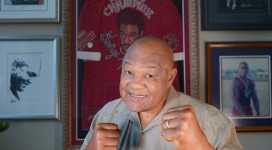Nelson Mandela, South Africa's first African president and anti-apartheid icon who was jailed 27 years in prison, led his country to democracy through peaceful protests, died Thursday. His speech and actions embodied the principles of his Christian faith - forgiveness and reconciliation. He was 95.
"Our nation has lost its greatest son. Our people have lost their father," President Jacob Zuma said in a televised address on Thursday night, adding that Mandela had died at 8:50 p.m. local time at his home. "His humility, his compassion and his humanity earned him our love."
A state funeral will be held, and Zuma called for mourners to conduct themselves with "the dignity and respect" that Mandela personified.
"Wherever we are in the country, wherever we are in the world, let us reaffirm his vision of a society... in which none is exploited, oppressed or dispossessed by another," he said, according to the New York Times.
President Barack Obama said in an address from the White House: "Madiba transformed South Africa and moved all of us. His journey from a prisoner to a president embodied the promise that human beings and countries can change for the better.
"His commitment to transfer power and reconcile with those who jailed him set an example all humanity should aspire to, whether in the lives of nations all our own personal ones."
"He achieved more than can be expected of any one man."
"I cannot imagine my own life without Mandela's example and so long as I live, I will do what I can to learn from him."
Minutes after the announcement, Britian's Prime Minister David Cameron led the tributes, and tweeted: "A great light has gone out in the world. Nelson Mandela was a hero of our time. I've asked for the flag at No10 to be flown at half mast."
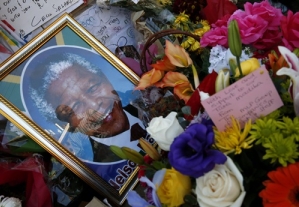
World Evangelical Christian Leaders Pay Tribute
Rev. Moss Ntlha, General Secretary of the Evangelical Alliance of South Africa (TEASA) says in a statement: "Madiba is considered by many as the father of the nation. He modelled firm confrontation with evil and injustice, and magnanimity in his triumph over those who sought his destruction. His passing calls to mind the prophetic tradition of Micah that says: "He has shown you, O mortal, what is good. And what does the LORD require of you? To act justly and to love mercy and to walk humbly with your God. (Micah 6:8)"
Rev. Aiah Foday-Khabenje, the General Secretary of the Association of Evangelicals in Africa (AEA) lamented: "The life of Madiba is yet another proof and reminder about the origin, nature and commonality of the human species; created in the image of God with ability to reflect some of God's attributes though vainly because of finitude, fallenness with feet of clay; regardless of race or geographical location. Heartfelt condolences to immediate family members and the people of South Africa. May his exemplary leadership inspire African leaders."
Dr. Geoff Tunnicliffe, Secretary-General of WEA says: "The world has lost a great leader. Nelson Mandela was a model of courage, vision and personal sacrifice. Today more than ever we need this kind of leadership. May the memory of Nelson Mandela inspire a new generation of such leaders around the world."
Mandela has been a Methodist Christian and has consistently proclaimed his commitment to Christ as his Lord throughout his adult life. His fight against racial inequality as well as leadership in reconciling the white South Africans, Afrikaners, with the black South Africans have reflected the ideals of Christian principles of justice, forgiveness and reconciliation, forming the bedrock for his political and social motivations.
In his autobiography, Long Walk to Freedom, Mandela tells the story of his early engagement with Christianity. "The Church was as concerned with this world as the next: I saw that virtually all of the achievements of Africans seemed to have come about through the missionary work of the Church." As a result, Mandela became a member of the Students Christian Association and taught Bible classes on Sundays in nearby villages.
27 Years in Prison
While working as a lawyer, Mandela, born in 1918, was repeatedly arrested for seditious activities and tried for high treason in December 1956 but was found not guilty. Although initially committed to non-violent protest, he co-founded the militant Umkhonto we Sizwe (MK) in 1961, leading a bombing campaign against government targets. He was jailed for five years in November 1962, and was sentenced to life imprisonment on June 12, 1964.
Mandela was released unconditionally from prison on February 11, 1990, after 27 years of imprisonment, first on Robben Island, and later in Pollsmoor Prison and Victor Verster Prison. He was 71. While in prison, he suffered lung damage while working in a prison quarry. He also contracted tuberculosis in the 1980s.
"As I walked out the door toward the gate that would lead to my freedom, I knew if I didn't leave my bitterness and hatred behind, I'd still be in prison," recalled Mandela, whose radical change in mindset would affect how he deal with his opponents.
In 1993, Mandela was granted the Nobel Peace Prize for his resistance against the ruling National Party's apartheid policies and for his efforts to establish nonracial democracy in South Africa.
Mandela was famously quoted, "One of the things I learned when I was negotiating was that until I changed myself, I could not change others."
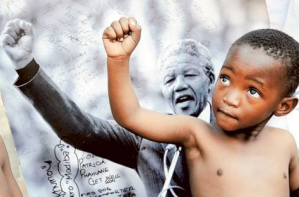
God's Way of Justice and Reconciliation
A few weeks before he was elected South Africa's president, Mandela gave a speech at the Zionist Christian Church Easter conference on 3 April 1994.After reading the Beatitudes (Matthew 5:1-12), he began by praising God for "The Good News borne by our risen Messiah who chose not one race, who chose not one country, who chose not one language, who chose not one tribe, who chose all of humankind!"
"Each Easter marks the rebirth of our faith. It marks the victory of our risen Savior over the torture of the cross and the grave. Our Messiah, who came to us in the form of a mortal man, but who by his suffering and crucifixion attained immortality."
In another speech at the church's Easter Conference, Mandela said:
"May Peace be with you!
We have joined you this Easter in an act of solidarity, and in an act of worship. We have come, like all the other pilgrims, to join in an act of renewal and rededication. The festival of Easter, which is so closely linked with the festival of the Passover, marks the rebirth of the resurrected Messiah,
Who without arms,
Without soldiers,
Without police and covert special forces,
Without hit squads or bands of vigilantes,
Overcame the mightiest state during his time.
This great festival of rejoicing marks the victory of the forces of life over death, of hope over despair.
We pray with you for the blessings of peace! We pray with you for the blessings of love! We pray with you for the blessings of freedom!"
South Africa Rugby World Cup 1995
Just a year after Mandela took presidency, South Africa hosted 1995 Rugby World Cup. It was also the first World Cup in which South Africa was allowed to compete following negotiations to end apartheid in 1992.
To black South Africans, the Springbok rugby jersey was one of the most hated symbols of apartheid. Rugby was a sport that the Afrikaner, "the oppressor," regarded as their way of life and a white privilege.
Whenever the Springboks played at home, there was always a small area of the stadium where the blacks were penned in. It was always full. And they always supported the visiting team. Moreover, their new president had helped orchestrate a decade-long international boycott of the Afrikaner's beloved team.
But Mandela, who was set out to lead the country towards reconciliation and forgiveness, was determined to turn rugby, once used by the African National Council (ANC) to bludgeon supporters of the racist government with boycotts, into a potent weapon to promote national unity
On the day of the final game between Sprinboks and the New Zealand All Blacks, the crowd - and millions of black South Africans looking on - held their breath in shock as former prisoner number 46664, Nelson Mandela, walked on the field dressed in Springbok's green and gold jersey and a cap.
The Afrikaners have been conditioned to believe that the President, for whom barely a handful voted, was not only a dangerous terrorist, but less than fully human.
But the crowd rose in disbelief and respect for Mandela's spirit of reconciliation.
A year before the 1995 Rugby World Cup, his first year as president, Mandela deliberately worked away at eroding the bitterness and mistrust of his black supporters, persuading them that the new slogan of the new Springboks, 'One Team, One Country,' was genuine.
In the final, held at Ellis Park in Johannesburg on 24 June, South Africa defeated New Zealand 15-12, with Joel Stransky scoring a drop goal in extra time to win the match.
No serious sports commentator believed that Springboks had the chance to win, especially when the All Blacks were the most formidable team ever played in the league.
Immediately following the final whistle, a TV commentator approached Pienaar and asked him what it felt like to have the support of 65,000 people.
Pienaar replied, "We didn't have the support of 65,000 South Africans today. We had the support of 43 million South Africans."
Mixed with the exuberance of raw emotions and hope for the future of the nation, the crowd consisting mostly of white South Africans chanted "Nelson, Nelson" as Mandela handed the Webb Ellis Cup to Springboks captain Pienaar.
"Francois, thank you very much for what you have done for our country," said Mandela.
"No, Madiba, you got it wrong," replied Pienaar. "It is nothing compared to what you have done for our country."
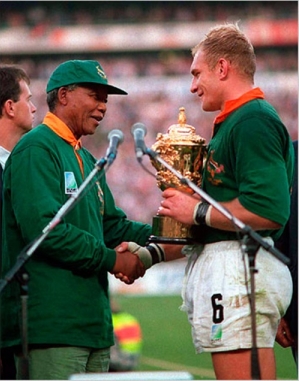
That day, South Africans cried in tears after tasting a glimpse of what it's like to be a "rainbow nation' - a country of one people united in heart and with non-racial tensions.
"Quite unbelievable, quite incredible, what happened," said Desmond Tutu, according to The Guardian. "It had the effect of just ... turning around the country. It was an incredible transformation. An extraordinary thing. It said, yes, it is actually possible for us to become one nation."
Mandela and Pienaar's involvement in the World Cup is the subject of the 2009 film Invictus, and the TV documentary The 16th Man in 2010.
That day, the Springboks may have won the world cup, but Mandela has won over the people of South Africa.
"For the first time all the people had come together and all races and religions were hugging each other. It was just wonderful," Springbok captain Pienaar later remembered, according to AFP.
"The cumulative effect was to allay the fears of the whites and also, by the way, of the blacks," Mandela recalled.
Eighteen years later racial tensions still run through Mandela's "Rainbow Nation," but widespread racial violence has been avoided.
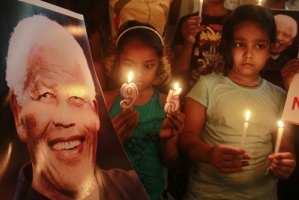
Latter Years of Presidency and Public Service
Madiba served as president from 1994-1999, and founded the following non-profits: Nelson Mandela Foundation, Nelson Mandela Children's Fund, The Mandela Rhodes Foundation, Nelson Mandela Institute for Education and Rural Development, and 46664 Campaign.
The United Nations in 2010 declared the Nobel peace laureate's birthday Mandela Day - a day to encourage people around the world to do 67 minutes of good deeds.







